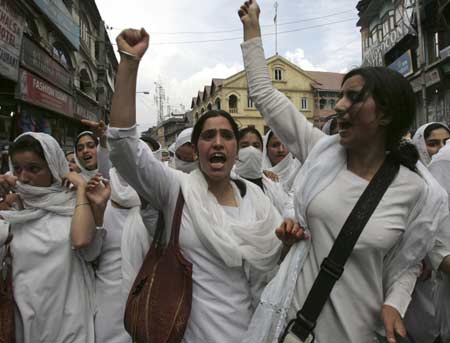Sunday, Jul 14, 2013, 7:54 IST | Agency: DNA Yolande D’Mello

Kashmiri rappers have been forced underground thanks to their music that authorities have labelled ‘anti-government’. But has that stopped them? Yolande D’Mello finds out.
What does it take to ensure that people can hear your voice?
For a few Kashmiri and Palestinian youth, it takes a rap song or two.
While growing up in Srinagar, Zubair Magray was dismayed to see the way the mainstream media overlooked various human rights violations in the name of national security. Magray took to rapping and is now one of the many rappers from Kashmir who rap under stage names about the ‘real’ situation in the state.
The songs that Magray aka Haze Kay sings touch upon issues surrounding the controversial Armed Forces Special Powers Act (AFSPA) and the Public Safety Act (PSA) but also include his personal story-telling. The music is part of a new wave of protest that takes a cue from similar protests in Palestine.
Another Kashmiri rapper Kasim Hyder aka MC Youngblood says his songs are just an attempt to give people the real picture of what happens in Kashmir. The songs are a reaction against what they see as one-sided reporting by news channels. “News channels are not telling the entire story… They just show protesting Kashmiri stone throwers but not the violence that led to it.”
Both Hyder, a student in Srinagar, and Magray, who is now studying engineering in Pune, choose to rap in English to reach out to a larger audience.
The Kashmiri youth incidentally have company in West Asia, where a Palestinian hip-hop band Da Arabian MC’s (DAM) also uses hip-hop artillery to fight a lone battle.
“Most governments and media agencies are pro-Israeli so our music was a way to tell the other side of the story,” said DAM’s Tamer Nafar.
DAM is currently touring the US. When they started out, they rapped in Arabic. Their first album with English songs is set to release in December.
It started with the second Infitada in 2000 when Suhell Nafar, Mahmoud Jreri and Tamer came together to rap. “Israeli troops would fire at Palestinian crowds but when Palestinian civilians revolted — suddenly the news channels would show up. I didn’t understand politics but I knew it was unfair,” says Nafar.
It’s the unfairness of it all that provoked Magray too. A peaceful protest in Kashmir is usually met with firing from police, he says. Following this, phone lines and Internet services are jammed so that no news can go out. “Can you imagine this happening in Mumbai?” asks Magray.
In 2010, his music was declared anti-government and the authorities started raiding recording studios he used. His friends also suggested he remove the songs he uploaded on YouTube to protect himself. The song was called Azadi.
These songs are popular among Kashmiri youth who connect with singers and their shared history.
It’s now impossible to find studios willing to record rap music in Kashmir, says Hyder. “They are scared and I don’t blame them,” he says.
But despite the clampdown, the music has not stopped thanks to technology that rappers can use to record at home. The songs are uploaded on YouTube and spread via social networking sites. Haze Kay’s latest upload was Burn the Dice last Sunday.
Hyder calls his songs a cog in the machinery to creating a noise on social media platforms online. “Who else can write about the strikes, random arrests, rape, disappearances… It is first hand information,” he says.
Young rappers also see their work as a creative expression for their angst. However, Hyder doesn’t consider himself political. He loves his music and is planning a collaboration with a few international artists. But Magray is more direct. “Music will also be a hobby.” But he wants to be able to go back and work in his hometown.
But no revolution is complete without martyrs. The rappers are often threatened with the PSA that they often refer to in their songs. This Act is used to ‘detain’ political leaders and activists, suspected members of armed opposition groups, lawyers, journalists and protesters.
Amnesty International, a global movement against human rights violations, has said that authorities in Jammu and Kashmir are using the PSA to detain individuals without sufficient evidence for a trial in order to ‘keep them out of circulation’.













